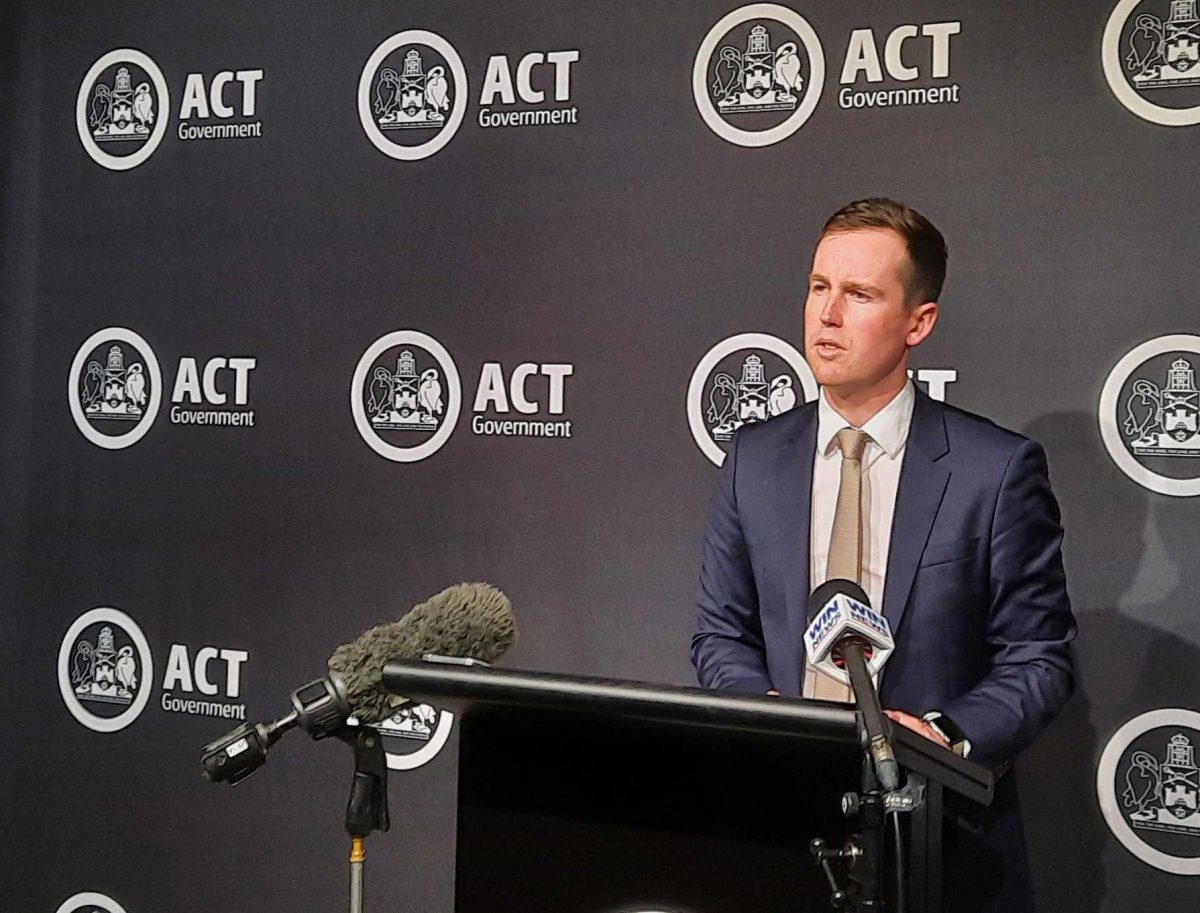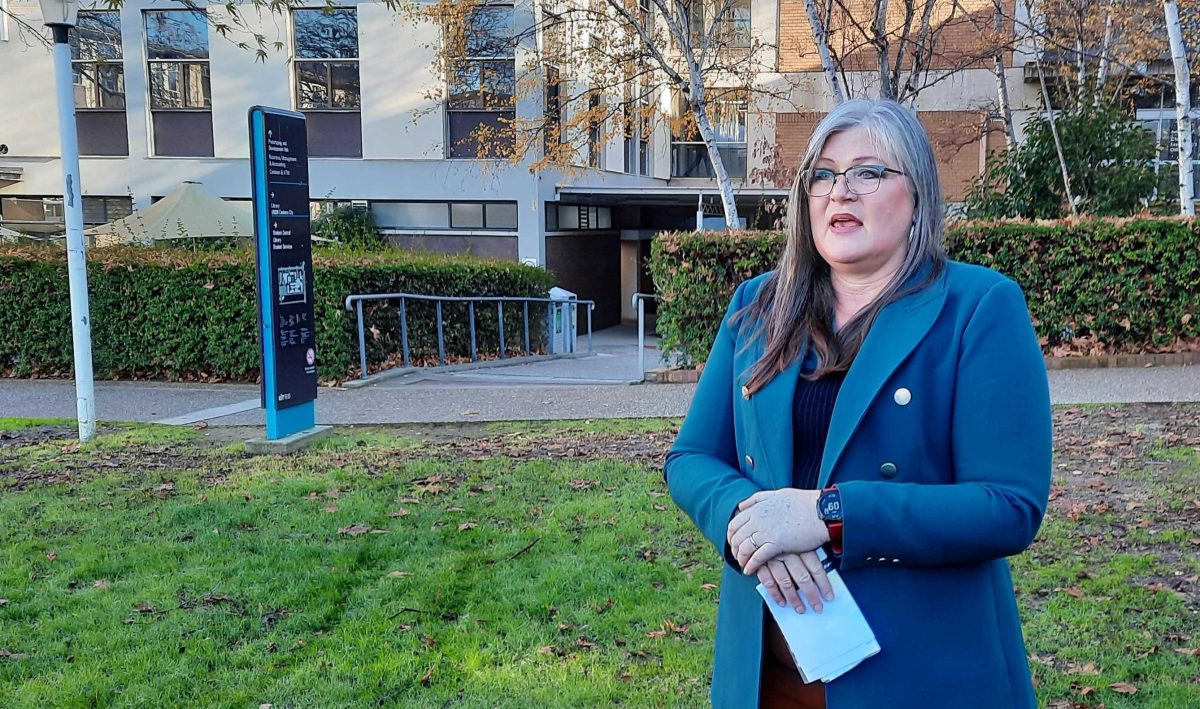
Skills Minister Chris Steel fronted the media this morning and called Leanne Cover’s actions a gross breach of public trust. Photo: Ian Bushnell.
Skills Minister Chris Steel has rejected claims he could have done more to head off the CIT contracts scandal that has resulted in a corruption finding against former CEO Leanne Cover.
The ACT Integrity Commission Special Report, released late on Thursday (27 June), found Ms Cover “guilty of serious corrupt conduct” over her actions regarding contracts worth $8.5 million awarded to consultant and “complexity and systems thinker” Patrick Hollingworth.
Operation Luna found Ms Cover had “intentionally concealed” from the CIT board a letter sent to her from Mr Steel in February 2021 expressing concerns over the procurement process.
The report also makes clear that Ms Cover ignored Mr Steel’s wishes that Mr Hollingworth’s companies not be engaged for any further work on the organisational change project, saying it would not “pass the pub test”. However, Ms Cover approved $5.5 million in contracts anyway without telling the CIT board.
But she was not found to have acted criminally and won’t be subject to prosecution.
The former board chair, Craig Sloan, escaped a corruption finding, but the report found his failure to keep the board and the minister properly informed was a “serious failure to exercise due care and diligence in the performance of his statutory responsibilities”.
After two years, the Commission’s work is still not finished, and the investigation will continue amid questions about Ms Cover’s motivation.

CIT CEO Leanne Cover was found to have acted corruptly but without criminality. Photo: File.
Opposition Leader Elizabeth Lee accused Mr Steel of a lack of oversight and being ineffectual between February 2021, when he expressed his concern about the contracts, and June 2022, when the issue broke in the media, and it became apparent that Ms Cover had continued to hire Mr Hollingworth as a consultant, prompting Mr Steel to cancel the final contract.
“Mr Steel, at best, dropped the ball and didn’t keep a close enough eye on this entire scenario that led to an additional $5.5 million of contracts being signed after he became aware of the concerns, and at worst, being utterly useless and ineffective in his role as minister in stopping millions of taxpayer money being thrown down the well.”
But Mr Steel said the report made clear that if Ms Cover had acted in good faith, then it would not have been necessary for him to intervene.
He said he had very broad, high-level power in relation to the CIT under the act, but it was not specific.
“I can’t get involved in procurements,” he said.
“Procurements are a matter for the agency. Employment is a matter for the statutory authority as well. But what I could do was question the contracts when I became aware of them.
“That’s exactly what I did. My office continued to raise concerns. The former CEO went ahead and contracted for this very large, ill-defined piece of work. That’s why she’s corrupt and it’s a gross breach of public trust that she went ahead.”
Mr Steel called it a pattern of dishonesty for more than a year in which she broke procurement rules and concealed information from her own board.
“If the board had known about those large procurements and had also known as well about my concerns, my office’s concerns … they wouldn’t have allowed her to go ahead with the contracts,” he said.
Mr Steel said the CIT board had tightened financial controls, and the government had taken action to ensure this type of thing did not occur again by implementing the Auditor-General’s recommendations, including a new escalation process, up to the minister if needed.
“I want to know, as minister, if one of my agencies or a statutory authority is breaching procurement rules, is not addressing risks that have been identified by the Government Procurement Board,” he said.
Mr Steel said the finding sent a very strong message to all senior executives in the public service and statutory authorities that they have to uphold the high expectations that ministers and the community have of them that they will use public funds efficiently and effectively.
He said the government was investigating if it could recover any of the public funds spent on the matter.
CIT had thrown aside the work done by Mr Hollingworth’s companies, Think Garden and Red Rouge Nominees, and started again on a new strategic direction.

CIT board chair Kate Lundy: “The report is explicit about how the board and the minister were misled.” Photo: Ian Bushnell.
Board Chair Kate Lundy believed Ms Cover’s dishonesty had blindsided the board and the minister.
“I think the inquiry and evidence and findings demonstrate that there was very little any party could do even at board level, let alone ministerial level because the truth was obfuscated,” she said.
“We wish we perhaps had asked more questions in different ways, but the report is explicit about how the board and the minister were misled.”
Ms Lundy said the reputational damage to CIT was devastating and the affair had also cost it an enormous amount of money and resources.
She said CIT would seek legal advice on opportunities to recover some of those costs.
Ms Lundy said staff were hurting but would feel vindicated, as she did, in some of their concerns and complaints.
“My commitment has been to ensure that staff are not only heard, but we have very strong processes in place to receive complaints, to respond to staff needs and issues,” she said.
“I’m very confident that the changes we’ve made over the last two years have rectified what some would have seen as some weaknesses in those channels of communication between leadership and staff in the past.”
Ms Lundy said CIT had put the Hollingworth era behind them and embarked on a fresh approach to its 10-year strategy that was bearing fruit.
“We’ve conducted external consultations on this strategy and they’ve gone exceptionally well,” she said.
“I think what we see now with the right-sized corporate structure, with a real conversation occurring amongst staff, our executive and the board, is that it is possible to change in the right kind of ways to prepare this institute for the future challenges.”
Ms Lundy said other agencies and statutory authorities had much to learn from what CIT had been put through.
“There are learnings for every single organisation, public sector and private sector, about the nature of contracting, about structures of systems and processes within organisations,” she said.
“They’re universal lessons. They should be heeded.”


















